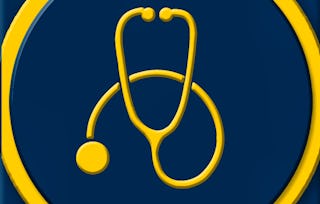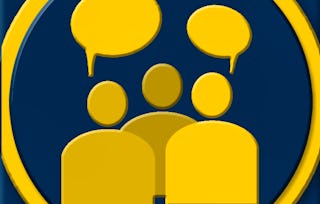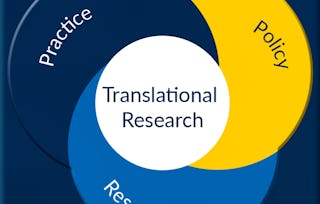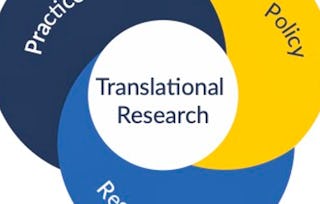The first phase of translational research — known as “T1” — is the process of moving foundational scientific discoveries into possible approaches for real-world health applications. This course focuses on innovations in basic science discovery, including drug discovery and repurposing and animal studies, that lead to new methods of diagnosis, treatment, and prevention in highly controlled settings. You’ll also discuss the role of the federal government to support and regulate translational research as it moves from basic science to human interventions.

Translating Basic Research into Research for Humans

Translating Basic Research into Research for Humans
This course is part of Translational Science Specialization

Instructor: Vicki Ellingrod
Included with
16 reviews
What you'll learn
Identify key differences between basic science research and clinical research
Understand innovations in basic science discovery that lead to new methods of diagnosis, treatment, and prevention
Explore potential career paths for basic science researchers
Skills you'll gain
Details to know

Add to your LinkedIn profile
6 assignments
See how employees at top companies are mastering in-demand skills

Build your subject-matter expertise
- Learn new concepts from industry experts
- Gain a foundational understanding of a subject or tool
- Develop job-relevant skills with hands-on projects
- Earn a shareable career certificate

There are 3 modules in this course
Welcome to Week 1 of Translating Basic Research into Research for Humans. This week you will learn how to 1) identify key differences between basic science research and clinical research, and 2) describe the role of animals in the research process.
What's included
10 readings3 assignments
Welcome to Week 2 of Translating Basic Research into Research for Humans. This week you will learn how to 1) describe potential career paths for basic science researchers, 2) identify team roles for research conducted in the T1 stage of translational science, and 3) describe the types of career development awards available for translational research education.
What's included
1 video1 reading1 assignment1 discussion prompt
Welcome to Week 3 of Translating Basic Research into Research for Humans. This week you will learn how to 1) explain the process of translating the outcomes of basic science research into improvements in human health, and 2) explain how T1 research is associated with T2 and T3/T4 research.
What's included
3 videos1 reading2 assignments1 discussion prompt
Earn a career certificate
Add this credential to your LinkedIn profile, resume, or CV. Share it on social media and in your performance review.
Instructor

Offered by
Explore more from Basic Science
 Status: Free Trial
Status: Free TrialUniversity of Michigan
 Status: Free Trial
Status: Free TrialUniversity of Michigan
 Status: Free Trial
Status: Free TrialUniversity of Michigan
 Status: Free Trial
Status: Free TrialUniversity of Michigan
Why people choose Coursera for their career

Felipe M.

Jennifer J.

Larry W.

Chaitanya A.
Learner reviews
- 5 stars
87.50%
- 4 stars
6.25%
- 3 stars
0%
- 2 stars
0%
- 1 star
6.25%
Showing 3 of 16
Reviewed on Jun 17, 2022
I love the overarching theme of person development and learning skills to find opportunties to further advance my understanding of this topic from a theoretical and practical perspective.

Open new doors with Coursera Plus
Unlimited access to 10,000+ world-class courses, hands-on projects, and job-ready certificate programs - all included in your subscription
Advance your career with an online degree
Earn a degree from world-class universities - 100% online
Join over 3,400 global companies that choose Coursera for Business
Upskill your employees to excel in the digital economy
Frequently asked questions
To access the course materials, assignments and to earn a Certificate, you will need to purchase the Certificate experience when you enroll in a course. You can try a Free Trial instead, or apply for Financial Aid. The course may offer 'Full Course, No Certificate' instead. This option lets you see all course materials, submit required assessments, and get a final grade. This also means that you will not be able to purchase a Certificate experience.
When you enroll in the course, you get access to all of the courses in the Specialization, and you earn a certificate when you complete the work. Your electronic Certificate will be added to your Accomplishments page - from there, you can print your Certificate or add it to your LinkedIn profile.
Yes. In select learning programs, you can apply for financial aid or a scholarship if you can’t afford the enrollment fee. If fin aid or scholarship is available for your learning program selection, you’ll find a link to apply on the description page.
More questions
Financial aid available,

